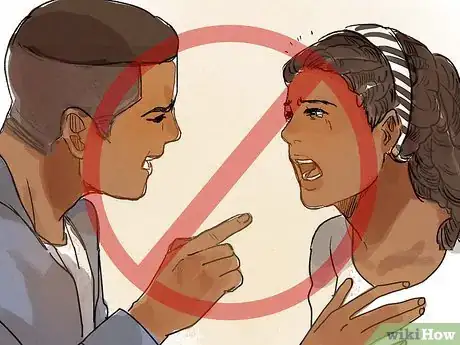This article was co-authored by Steven Hesky, PhD. Dr. Steven Hesky is a Licensed Clinical Psychologist with over 37 years of experience. He specializes in long-term psychotherapy with adults and adolescents. His training includes Freudian, Jungian, and Existential approaches to psychotherapy, hypnosis, family therapy, marriage counseling, and biofeedback. Dr. Hesky holds a BA in Philosophy from Lake Forest College and an MA and PhD in Existential Clinical Psychology from Duquesne University.
There are 8 references cited in this article, which can be found at the bottom of the page.
This article has been viewed 18,641 times.
You might fear stepparenting your emerging teenager, and knowing your role can be difficult as you try to build a relationship with your partner’s child. It’s difficult to know when to implement rules, let things slide, or when to get your partner involved. Work with your partner and agree on how to handle problem behaviors. Approach the teen in a genuine and respectful way. While you may need to discipline the teen at times, be sure to be the adult and handle the situation as calmly as possible.
Steps
Working with Your Partner
-
1Avoid implementing lots of changes. You may feel like an expert in raising teens if you’ve already raised your own or have certain standards for behavior in your home. However, take it slow when dealing with a teen, especially if you’ve recently walked into the role of stepparent. Don’t be too quick to implement changes or make things different.[1] Your changes may be helpful but take them slowly and don’t be forceful. Talk over your requests with your partner and decide on a timeline.
- Remember that the teen has likely endured lots of changes between parental divorce or separation, remarriage, relationships with siblings and stepsiblings, moving, or traveling between parents. There may be physical challenges as well as emotional challenges.
- Allow some time for both of you to get adjusted to your new living arrangements before implementing changes. Remember that relationships need time to grow.
- Make sure to take the circumstances into account. For example, children who are mourning the loss of a deceased parent or the separation or divorce of their birth parents may need time to heal before they can fully accept you as a new parent.
-
2Set house rules with your partner. Instead of making rules or responding to the teen’s behavior on your own, have rules and consequences set in place which you and your partner create together.[2] Determine what time curfew is, how often the teen should contact you, and how to arrange hanging out with friends or using the car.
- Let the natural parent take the lead in enforcing rules, as teens may be more willing to accept rules or consequences from their biological parent.
- Consider involving the teenager in setting rules if any changes need to be made so that they feel validated and agree to them mutually.
- Get on the same page with your partner’s ex to create a sense of consistency across environments.[3]
-
3Let go of control. Expect the teen to make mistakes and poor decisions. You might want more control, rules, and order in your home, and if there’s something that teens hate, it’s control, rules, and order. If the teen is caught up in bad choices or poor behavior, don’t rush in to reprimand. Consider letting their biological parent handle it, or talk it over with your partner first. Have a talk, make a consequence, and then forgive them.[4] [5]
- If you tend to want to control the teen’s behavior, talk about how to handle bad attitudes, moodiness, and poor choices. Decide on a way to address these issues together.
Creating a Respectful Relationship
-
1Respect their privacy. When communicating with the teen, remain willing to listen. Respect the teen’s privacy and give them alone time when they ask for it.[6] Don’t demand that they spend time with you, engage in daily family time, or spend less time with friends. Remember that teens need social time with their friends to develop their identities, and don’t take their skimping on family time personally.
- Remember to put the stepchild's needs first. Sometimes making yourself scarce can be better initially, especially if the stepchild wants to spend time with their birth parent.[7]
- Whatever you do, don’t go through their things or read their journal. If you’re found out, it can damage all trust between you.
-
2Treat them fairly. If you have your own biological child or teen, treat your stepchild the same. You might be able to forgive your own child or handle their moods or behavior better than your stepchild’s. Be aware of your attitudes toward your own kids and your stepkids and do your best to be just as forgiving, patient, and loving.[8]
- Have consequences that apply to anyone who breaks a rule without exceptions or favoritism.
-
3Don’t put on an act. Teens have a way of seeing through anything that’s phony or hypocritical. Don’t try to be someone you are not or act in a disingenuous way. It’s likely that anything considered phony by the teen will be met with disdain.[9]
- Be real with the teen. Be yourself and be honest in what you say.
- Especially because teens are developing their own identity, be a good role model and show integrity in what you do and who you are.[10]
-
4Spend time just the two of you. Stepkids may feel like they have to compete for their parent’s attention when you are around. Having one-on-one time with the teen can help you form a relationship by getting to know one another, forming companionship, and communicating more effectively.[11] Plan time for the two of you to do something fun together.
Handling Difficult Behaviors
-
1Be ready for power struggles. Your teen might fire back, “You’re not my real mom!” or “You’re not my dad!” Be ready for this type of response and understand why the teen may say it. The teen likely feels like they’re in a power struggle and wants to take power away from you. Don’t allow the teen power through this statement. Instead, respond by saying, “You’re right, I’m not your biological parent, but I am your stepparent. And that doesn’t change the fact that I love you and care about you.” [14]
- Be firm but gentle when dealing with teens. Be clear in exerting your power, but not just for the sake of doing so.
- If the teen is rude to you, communicate that the teen must respect you, even if they don’t like you.[15] Have your partner say, “When you disrespect your stepparent, you disrespect me.” It’s important and helpful for you and your partner to be on the same page and display a united front when addressing these difficult behaviors.
-
2Remain calm. Your step-kid may push your buttons and really frustrate you. Even if they push you away, don’t take it personally. It’s unlikely that they are trying to hurt you, and may lack the skills to express their emotions in a better way. Any distance you experience isn’t personal either; teens want to (and need to) spend time with their peers as part of developing their identities.[16] If your teen is angry or upset with you, resist the urge to fight back. Stay calm and in control.
- When you start to get angry, take some deep breaths and delay responding right away. If you don’t feel calm, defer to your partner, the child’s parent, to control the situation.
-
3Encourage positive behaviors. Focus less on negative behaviors and instead, praise positive behaviors.[17] Find behaviors to compliment and reward. Show positive reinforcement instead of pointing out all of the negative things the teen does.
- If the teen feels noticed for doing good things, they may feel more positively toward you and less combative.
- Be genuine and honest in your praise without overdoing it, as they may sense when you aren’t being authentic.
- For example, say, “Thanks so much for cleaning up after dinner tonight.”
- You can also say, “I know getting along with your stepsister is difficult, but I see that you’re trying, and that means a lot.”
-
4Remember that teens don’t want a tense relationship either. If you fear having a difficult, argumentative, tense relationship with your teen, remember that the teen doesn’t want a conflicting relationship just as much as you don’t. Teens don’t want to fight or experience tension in their relationships, especially at home.[18]
- When you start to clash with your teen, remind yourself that they don’t want conflict either. Do your best to calm any regular tensions by finding compromises. For example, there might be topics that you avoid bringing up altogether in order to keep the peace.
-
5Handle emerging sexuality carefully. Teens begin to explore their sexuality and express it in many different ways. You might find that your stepchild dresses differently in front of you (for example, walking around in a muscle shirt or bikini) or acting flirty toward you. If you notice this kind of behavior, remember that you’re the adult here. While you may not want to reprimand the teen, let your partner know of the behaviors.[19]
- Keep communication open yet do not respond to any advances.
- If being physically affectionate feels weird for either you or the teen, show your care through words and smiles.
Expert Q&A
-
QuestionHow can I improve my relationship with my teenage stepdaughter?
 Steven Hesky, PhDDr. Steven Hesky is a Licensed Clinical Psychologist with over 37 years of experience. He specializes in long-term psychotherapy with adults and adolescents. His training includes Freudian, Jungian, and Existential approaches to psychotherapy, hypnosis, family therapy, marriage counseling, and biofeedback. Dr. Hesky holds a BA in Philosophy from Lake Forest College and an MA and PhD in Existential Clinical Psychology from Duquesne University.
Steven Hesky, PhDDr. Steven Hesky is a Licensed Clinical Psychologist with over 37 years of experience. He specializes in long-term psychotherapy with adults and adolescents. His training includes Freudian, Jungian, and Existential approaches to psychotherapy, hypnosis, family therapy, marriage counseling, and biofeedback. Dr. Hesky holds a BA in Philosophy from Lake Forest College and an MA and PhD in Existential Clinical Psychology from Duquesne University.
Licensed Clinical Psychologist Focus on being her friend and supporter above all else. Be open to sharing advice with her when she asks, or even offering unsolicited guidance if she seems willing to listen.
Focus on being her friend and supporter above all else. Be open to sharing advice with her when she asks, or even offering unsolicited guidance if she seems willing to listen. -
QuestionIs being a step-parent harder than being a parent?
 Steven Hesky, PhDDr. Steven Hesky is a Licensed Clinical Psychologist with over 37 years of experience. He specializes in long-term psychotherapy with adults and adolescents. His training includes Freudian, Jungian, and Existential approaches to psychotherapy, hypnosis, family therapy, marriage counseling, and biofeedback. Dr. Hesky holds a BA in Philosophy from Lake Forest College and an MA and PhD in Existential Clinical Psychology from Duquesne University.
Steven Hesky, PhDDr. Steven Hesky is a Licensed Clinical Psychologist with over 37 years of experience. He specializes in long-term psychotherapy with adults and adolescents. His training includes Freudian, Jungian, and Existential approaches to psychotherapy, hypnosis, family therapy, marriage counseling, and biofeedback. Dr. Hesky holds a BA in Philosophy from Lake Forest College and an MA and PhD in Existential Clinical Psychology from Duquesne University.
Licensed Clinical Psychologist Not at all! In fact, step-parenting is actually easier and more fun than being a regular parent.
Not at all! In fact, step-parenting is actually easier and more fun than being a regular parent. -
QuestionDoes a stepparent have the right to discipline?
 Steven Hesky, PhDDr. Steven Hesky is a Licensed Clinical Psychologist with over 37 years of experience. He specializes in long-term psychotherapy with adults and adolescents. His training includes Freudian, Jungian, and Existential approaches to psychotherapy, hypnosis, family therapy, marriage counseling, and biofeedback. Dr. Hesky holds a BA in Philosophy from Lake Forest College and an MA and PhD in Existential Clinical Psychology from Duquesne University.
Steven Hesky, PhDDr. Steven Hesky is a Licensed Clinical Psychologist with over 37 years of experience. He specializes in long-term psychotherapy with adults and adolescents. His training includes Freudian, Jungian, and Existential approaches to psychotherapy, hypnosis, family therapy, marriage counseling, and biofeedback. Dr. Hesky holds a BA in Philosophy from Lake Forest College and an MA and PhD in Existential Clinical Psychology from Duquesne University.
Licensed Clinical Psychologist Honestly, it's better to defer to the biological parent. You definitely don't want to create any type of authoritarian relationship with your teenage stepchild.
Honestly, it's better to defer to the biological parent. You definitely don't want to create any type of authoritarian relationship with your teenage stepchild.
References
- ↑ http://www.parents.com/parenting/dynamics/how-to-discipline-child-step-parent/
- ↑ http://www.beingastepparent.co.uk/dealing-with-teenage-stepchildren.html
- ↑ http://www.webmd.com/parenting/features/tips-for-stepparents#1
- ↑ https://www.psychologytoday.com/blog/stepmonster/200911/teens-can-drive-you-nuts-especially-when-theyre-not-yours
- ↑ Steven Hesky, PhD. Licensed Clinical Psychologist. Expert Interview. 2 September 2021.
- ↑ http://www.familyeducation.com/life/relating-stepchildren/stepparenting-adolescent-what-expect?page=1
- ↑ http://www.parents.com/parenting/dynamics/how-to-discipline-child-step-parent/
- ↑ https://www.psychologytoday.com/blog/stepmonster/200911/teens-can-drive-you-nuts-especially-when-theyre-not-yours
- ↑ http://www.familyeducation.com/life/relating-stepchildren/stepparenting-adolescent-what-expect?page=1
- ↑ https://www.psychologytoday.com/blog/stepmonster/200911/teens-can-drive-you-nuts-especially-when-theyre-not-yours
- ↑ https://www.psychologytoday.com/blog/surviving-your-childs-adolescence/200909/remarriage-adolescents-the-perils-step-relationship
- ↑ Steven Hesky, PhD. Licensed Clinical Psychologist. Expert Interview. 2 September 2021.
- ↑ Steven Hesky, PhD. Licensed Clinical Psychologist. Expert Interview. 2 September 2021.
- ↑ http://www.webmd.com/parenting/features/tips-for-stepparents#1
- ↑ http://www.parents.com/parenting/dynamics/how-to-discipline-child-step-parent/
- ↑ http://www.familyeducation.com/life/relating-stepchildren/stepparenting-adolescent-what-expect
- ↑ http://www.parents.com/parenting/dynamics/how-to-discipline-child-step-parent/
- ↑ http://www.familyeducation.com/life/relating-stepchildren/stepparenting-adolescent-what-expect
- ↑ http://www.familyeducation.com/life/relating-stepchildren/stepparenting-adolescent-what-expect?page=1





























